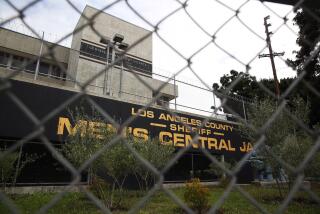Opinion: L.A. jails get a monitor, but that’s just a start
The lead story in Thursday’s Times is the news that the L.A. County Sheriff’s Department has agreed to have a federal monitor ride herd over jail reforms -- in particular, the efforts to stop deputies from abusing the people they incarcerate and improve the treatment of mentally ill inmates.
This may seem like a watershed moment for the Sheriff’s Department, not unlike the consent decree in the Rampart case that brought federal oversight to the L.A. Police Department. The similarities, though, are confined to the fact that the agreement announced Wednesday and the Rampart decree represent the start, not the culmination, of a process that’s likely to take years.
The main difference is that the appointment of Richard Drooyan as an independent monitor of the jails is but one of the many steps needed to fix the Sheriff’s Department. The Times’ editorial board laid them out in a December editorial welcoming the county’s settlement of the Rosas class-action lawsuit, which itself grew out of a previous class-action settlement involving a pretrial detainee named Dennis Rutherford:
“Rutherford and Rosas, with their ongoing monitoring requirements, together with another recent settlement under which the county acknowledged that it inadequately accommodates inmates with physical disabilities, plus a yet-to-be-concluded consent decree with the U.S. Department of Justice over mistreatment of mentally ill inmates and the still-unfulfilled recommendations of the Citizens Commission on Jail Violence, provide a patchwork of monitoring and mandates to improve the jails.
“In total, the agreements are reminiscent of the LAPD consent decree. But they lack the coherence of the LAPD consent decree, with its single set of mandates, single judge and single monitoring team. It is by no means a foregone conclusion that, singly or collectively, the decrees, settlements and recommendations will enable the Sheriff’s Department to make the turnaround it needs.”
Not to keep raining on Drooyan, who served ably as the lead counsel for the Los Angeles County Commission on Jail Violence and as president of the Los Angeles Police Commission. But the December editorial included this cautionary note that’s worth bearing in mind now: “[I]t is not necessarily enough to identify problems and promise to fix them. Such promises have been in place for 40 years, and they resulted from events that have a distressing ring of familiarity today.”
Follow Healey’s intermittent Twitter feed: @jcahealey
More to Read
A cure for the common opinion
Get thought-provoking perspectives with our weekly newsletter.
You may occasionally receive promotional content from the Los Angeles Times.







